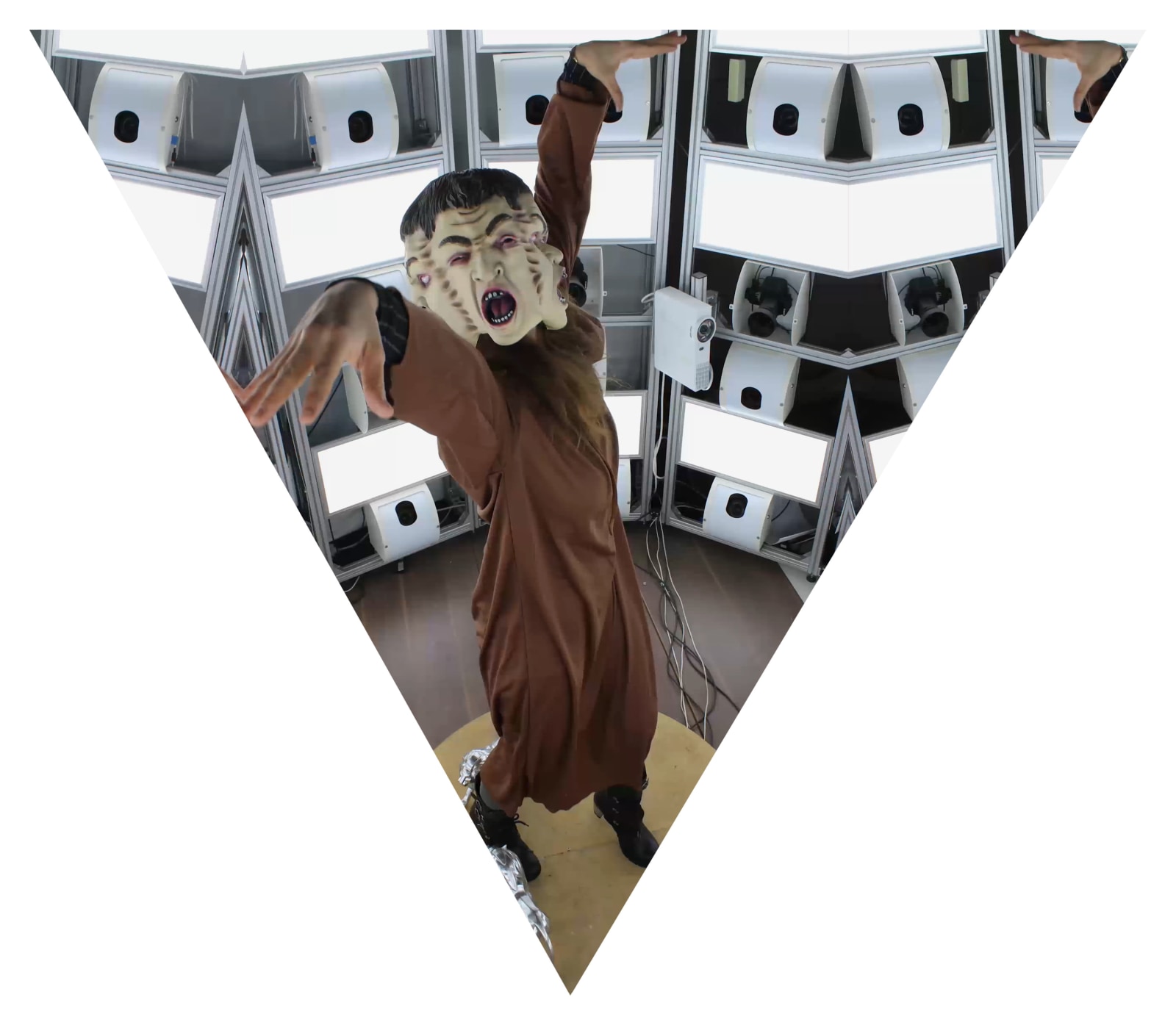
Raphaela Vogel
I Am Touching
Film Still
2023
Petzel is pleased to present In the Expanded Penalty Box: Did You Happen to See the Most Beautiful Fox?, an interdisciplinary exhibition of new works by Berlin-based artist Raphaela Vogel, in which she unfolds her enigmatic form repertoire beyond aesthetic orthodoxies. The show marks Vogel’s first exhibition with the gallery, as well as her first solo exhibition in the US, and will be on view from January 11 to February 17, 2024, at Petzel’s Chelsea location at 520 West 25th Street.
Through surrealistic and autobiographically composed environments, Vogel deals with power dynamics ranging from questions of gender to human-animal and machine relations. Here, phallic forms of spatial production and the urges of male voyeurism are confronted by Vogel’s highly subjective camera and occupation of space. Her installations and video collages often feature metal sounds, drones, field recordings, pop songs, and singing hooligans sampled from Vogel’s own cultural memory. The artist’s ambiguous play with received notions of architectural and artistic mastery is reflected in the employment of readymades associated with the public realm: steel girders, cars, urinals, or heraldic statues. These symbols of power are often paired with visceral white polyurethane sculptures and painterly stretched animal skins, transforming the virile rectangular predominant in architecture and painting into triangular bodily objects.
In the Expanded Penalty Box: Did You Happen to See the Most Beautiful Fox? interlocks new hallucinogenic video collages, sculptural monumentalism, and ritualistic paintings with questions of intersubjectivity, technogenesis, and a culture of remembrance. The center of the gallery is occupied by a retrofuturistic apparatus. This 360-degree 3D scanner functions as a panoptic confessional for exhibitionist self-monitoring where visitors can become masters and servants of themselves: a metaphorical penalty box of another kind. Once inside, in a fraction of a second, 70 single-lens reflex cameras capture every detail and angle of a body. But only for a fleeting moment do the scanned pictorial fractures of oneself pop up on a screen in order to vanish again without being stored in the digital ether.
Hanging above the scanner is a steel pyramid with a triangular banner that serves as a projection screen. A bronze sculpture of an anatomical human model reminiscent of Le Corbusier’s “Modulor”—an ideal of man, and ableist universalism—holds the video projector like a petrified servant. In a haphazard stop-motion sequence of images, we see a person with a gruesome mask: three-faced instead of Janus-headed. Squirming on a round platform—the Brechtian turning stage—it is the artist herself who spreads silver-heeled legs into the air. Vogel, who has been the sole actor and performer in all her video works to date, holds two small silver lion statues—a recurring symbol for potency—diametrically toward each other. “All hail the dead,” the video montage shrills, while the subject in the vertigo of the scanned image sequences seems to be repeatedly evading. Liminal thresholds are occupied here beyond the binaries of the modern and archaic, outside and inside, private and public—right up to the inscribed duality that a supposedly trivial tango partner dance entails: leading-following, dependence-independence, trust-distrust. “Jede Frau ist Schön” (“Every Woman is Beautiful”), Vogel can be heard singing the title line from a previously unrecorded light-hearted composition by Carla Boehl, the 1930 Miss Germany, to which the Jewish-German writer and theater director Erich Hopp wrote the lyrics. Vogel came across Hopp’s biography and work when she moved into the house in Eichwalde outside Berlin where he was hiding from Nazi persecution until being liberated by the Red Army.
Also in the gallery, artificial animal skins carry painterly renderings, dangling from hollow horse heads made of white polyurethane elastomer. Back-to-back, these two portraits are hanging as if on the swaying scales of Justitia: Jürgen Habermas, the most prominent philosopher of the 1980s Historians’ Dispute, and Achille Mbembe, the post-colonial theorist. Such as in this work Vergleiche vergleichen (Compare Comparisons), Vogel creates her own pataphysical macro- and microcosms, picture generators, and carriers. These metamorphose into images themselves, where a “triolectical” potential, as Situationist artist Asger Jorn described it, beyond the binary, and multi-perspective storytelling is made productive as one of the most fundamental forms of historical consciousness-raising.
—Elisa R. Linn
About Raphaela Vogel
Raphaela Vogel (b. 1988, Nuremberg, DE) is an artist living and working in Berlin. She studied at the Städelschule in Frankfurt, as well as the Academy of Fine Arts in Nuremberg. She has been a visiting professor at the State Academy of Fine Arts Karlsruhe and is currently a professor at the Academy of Fine Arts, Munich.
Raphaela Vogel’s practice is installation-based, fusing sculpture, sound, and film, often appearing in iterations of the latter as herself. Vogel plays with varied media and materials to generate energy and tension, finding uncanny harmonies among seemingly disparate source imagery. Through her works, Vogel’s pushes the viewer into disruptive, fantastical territories.
The artist will have solo exhibitions in 2024 at institutions including Kunsthalle Gießen, Germany and Centre d’art contemporain–la synagogue de Delme, France. Vogel was included in the 2022 Venice Biennale exhibition The Milk of Dreams, curated by Cecilia Alemani, and has had recent solo exhibitions at institutions such as De Pont Museum of Contemporary Art, Tilburg, Netherlands (2023); Kunstverein am Rosa-Luxembug-Platz, Berlin, DE (2023); Kleiner Wasserspeicher, Berlin, DE (2021); Neues Museum, Nürnberg, DE (2020); Kunsthaus Bregenz, DE (2019); Haus der Kunst, Munich, DE (2019); Leopold-Hoesch-Museum, Düren, DE (2018); Kunsthalle Basel, Switzerland (2018); Kunstpalais, Erlangen (2018); Westfälischer Kunstverein, Munster, DE (2016); Bonner Kunstverein, Bonn, DE (2015), among others.
Petzel Gallery is located at 520 West 25th Street New York, NY 10001. Gallery hours are Tuesday through Saturday from 10:00 AM–6:00 PM. For press inquires, please contact Ricky Lee at ricky@petzel.com, or call (212) 680-9467.